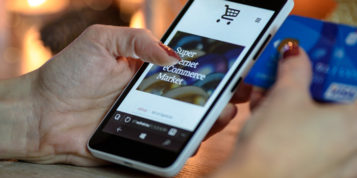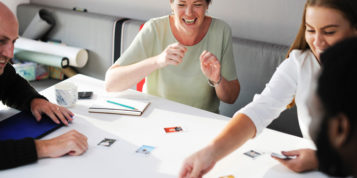Co-creation is the joining together of people to produce a mutually valued outcome. It is the cultivation of win-win solutions where efficiency, profitability and staff fulfilment march hand in hand. When successfully achieved:
- Staff enjoy being at work, feel respected, honoured and stay longer in the company
- Problems get solved in surprisingly simple and practical ways
- Creativity is ignited and entirely new ideas emerge
- Management is freed up to work on the business
- Consistent growth and profitability are ensured
Given such major benefits why is it that so few companies manage to achieve it?
The answer lies in the fact that people only commit to meaningful co-creation when they feel they trust one another. If the level of trust is low, just as soon as anything untoward happens the negative ego, that part of us that is rooted in unresolved past hurt, takes charge. Misunderstandings occur, fear, short-sightedness and selfishness take the place of reason and poor decisions get made. So how can we overcome this negative ego?
TOOLS FOR OVERCOMING THE EGO
- Resist Blaming Outer Circumstances
Blaming outside circumstances such as a recession, government policy or even cancelled orders actually disempowers ourselves. We give away our potential to adapt and close ourselves off from seeing new opportunities. This all happens at a subtle level but it is real. In every recession there are companies that re-invent themselves and this resurgence is down to them not being entrenched in negative thinking.
Far better in such situations to check our thinking and ask ourselves quietly:
‘With regard to (name the challenge) what do I need to learn from this situation?’
We may have to do this many times over but such self inquiy helps release us from the prison in which we encarcerate ourselves when we blame outer circumstances. The answers we receive may not in themselves be the ‘big idea’ we need to break through, but they will nudge us towards our ideal solution.
- Resist Judgement and Criticism of Others
Blaming other people is a result of ‘projection’. We all do it and it has the same effect as blaming outer circumstances, we disempower ourselves.
‘Projection’ is the term used by psychologists to describe the process by which people hide aspects of themselves they do not want to acknowledge, instead, attributing them to others. It is a remarkably subtle and involuntary ego defence mechanism. Its purpose is to avoid the fearful thoughts and feelings the conscious mind believes it cannot deal with. Rather than face what we perceive to be our negative traits, we blame them on others.
We expend lots of energy in suppressing the aspects of ourselves we reject, but what we resist always persists. Far better when we notice ourselves doing it, check our thinking and ask ourselves:
‘What is (name the person) reminding me of that is actually an aspect of
my own personality that I do not like?’
Again, we may have to do this many times over, but the advantages are that we start to release ourselves from the projection and begin to see the other person in a new and positive light.
- Practice ‘Pacing’
Pacing is when we acknowledge what the other person is saying by repeating back to them what we have heard them say. It demands attentive listening. An introduction might be:
Joe – I’d really like to understand what you are saying. Can I repeat back what I think
you are saying and you can tell me whether or not I have got it right, and if not
where I’m going wrong.
Pacing calms situations down, brings deeper understanding and creates trust. It is a listening exercise – you are not agreeing to whatever the other is saying, but you are seeking a deeper understanding.
It is an useful tool with people who tend to be ‘Ah-But-ers’, change averse people who automatically object to new thinking. They are the ones who, just as soon as anything innovative is suggested, come up with a theory as to why it cannot work. Such people are resistant to change because on some level they are living in fear and bound by their own ego. When we make ourselves fully present and listen to them in an open way, without judgement, then they feel heard and supported. Their fears dissolve, and they begin to let their barriers down. The effect can be so freeing and uplifting that they relax their resistance sufficiently to give the new idea a proper try. I have even seen cases where people have completely turned around and become strong advocates for whatever it was they were previously set against.
- Nurture Intuition
The Universe is constantly trying to help us free us from our negative ego and it speaks to us through our intuition. Unfortunately however pressures at work, being hunched over a computer all day, not taking proper breaks and stress generally all dumb our intuition.
When we consciously decide to recognise our intuition, it willingly and increasingly communicates to us; by allowing it space and giving it focus, we strengthen it. We nurture our intuition by regularly absorbing ourselves in activities that take us completely away from our routine thinking, out of our heads, and into our bodies. For me, this is through meditation and walking in open country. For others, it might be running, horse riding, or dancing to music. The main criterion is that it be pleasurable and regular; it is too easy to get busy and make excuses. It is when we get back to our true selves and feel relaxed and centred that we allow space for our intuition to come through.
- Ask Specific Questions of Our Higher Self
Our Higher Self, that part of us that is pure and represents the truth of who we really are, wants to lead us to places beyond our limited imagination. It seeks win win solutions and shows up as a step-by-step guide, as to what best to do next. Whilst it is expressed spontaneously through intuition, it can also be consulted pro-actively.
When we ask specific questions of our Higher Self we usually get an answer. Firstly take a couple of deep breaths, close your eyes, and step back from any immediate emotional ties to the issue. Then pose the question. The right answer will always carry more vitality and enthusiasm and the first answer is usually the best one. Anything that comes later risks being influenced by our customary limiting beliefs.





